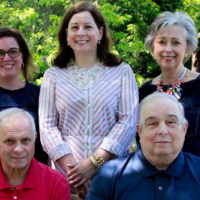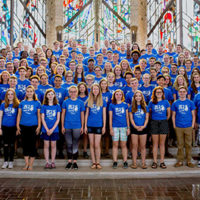Unsurprisingly, the last two months at the Christopher Family Foundation have involved a lot of Zoom calls. Amidst the inevitable cat cameos and sounds of home-schooling run amok, our grantees have awed us with their fortitude, enduring optimism, and the endless ways in which they are adapting to this moment.
And yet…this isn’t, by any stretch, the first time we’ve witnessed our nonprofit colleagues’ brilliance as they identify a new or increased need, determine the best solutions, and deftly adjust their work to respond. Recently, writer and social innovator Andrew Zolli offered this lens. “Crises destroy, reveal, and liberate. Our spirit of creative possibility matters more than ever. What do we keep of the past and what do we reimagine?” Without question, every single one of our grantee organizations is reimagining their work. Here, we’ll highlight a few examples from our portfolio.
Long before the rest of us were scrambling to stock up on toilet paper, Fresh Meals on Wheels of Sheboygan County (FMOW) was keeping close watch on the compounding numbers of COVID-19 cases abroad and beginning to make contingency plans. To protect the health of their vulnerable clients—elderly, disabled, and homebound residents—they quickly switched from delivering daily hot meals to weekly, bulk, flash-frozen delivery, along with toilet paper and other essentials. Since the new no-contact delivery model eliminated wellness checks, FMOW volunteers began making daily phone calls to residents in an effort to combat feelings of isolation and depression.
Maintaining a sense of community and emotional wellbeing was important to Boys & Girls Clubs of Chicago as well. With Clubs closed to comply with the stay-at-home order, staff created a Virtual Club experience with academic and enrichment activities—plus, “Club for Home” kits with snacks, masks, and old-fashioned games like playing cards and a jump rope. Knowing that food insecurity is a reality for many Club families, they are also partnering with local restaurants and caterers to provide meals at ten Clubs across the city.
As the crisis took hold, West Cook YMCA identified another urgent developing need—emergency childcare for essential workers. Once they made the decision to redirect their resources to support this need, they developed a detailed emergency childcare operational plan, which included an onsite nurse, small classroom ratios, and strict sanitation protocols. Fourteen days after schools closed, West Cook Y began accepting children. They plan to continue this program throughout the summer months.
Small business entrepreneurs have, and will continue to be, hard hit by the current economic downturn. Accion Chicago wasted no time taking action to help support the city’s small business entrepreneurs. They immediately instituted a 3-month payment deferment of 90% for existing borrowers. Through city and state programs, they loaned $20.7 million and granted $15 million, with an emphasis on businesses in low- and moderate-income communities in the region. By the end of May, they will have moved a total of nearly $36 million of grants and loans directly into the hands of local small business owners to help them persevere through this tumultuous time.
The shortage in personal protective equipment was a call to action for many, including the Museum of Science and Industry (MSI). When doors closed in mid-March, staff temporarily removed 20 of the Museum’s “Wanger Family Fab Lab” 3D printers to off-site locations and homes to produce face shield frames and stopgap face masks to support healthcare and other essential workers in need of additional PPE. At full capacity, MSI staff are making 500 face shield frames per day, and are approaching over 8,000 parts produced to date. 3D printing inspired Jane Addams Resource Corporation as well, and they are now building out a new curriculum, and career pathway, that keeps their job seekers at the forefront of manufacturing trends.
This moment in time offers countless lessons. For me, it underscores the essential role of nonprofits and their incredible ability to dig their heels into social challenges and respond with creativity and compassion.
—Contributed by Molly Truglia, Program Associate


 About Us
About Us Programs
Programs